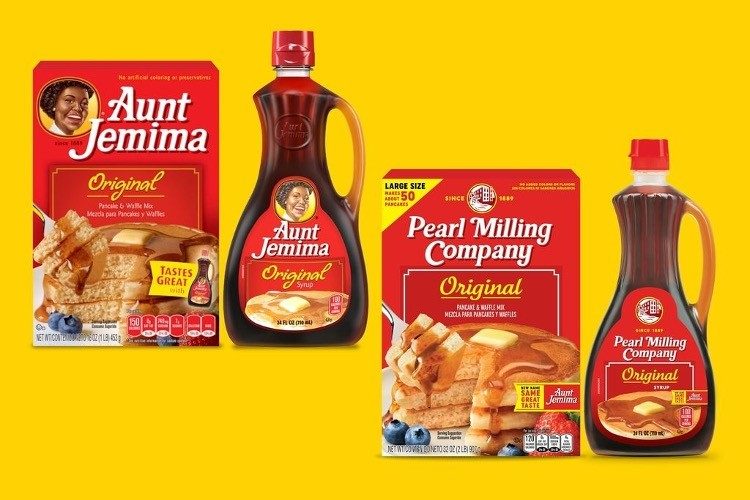
What do the Keystone XL pipeline workers and Aunt Jemima have in common?
They’re both now unemployed — for no good reason.
Auntie was warned of her fate. As The New American reported last June, providing some background, “First it was Confederate statues, then effigies of Columbus and other Americans. Then it was Cops and Gone with the Wind. Even Honest Abe isn’t safe from the Black Lives Matter mob.”
“And now, Aunt Jemima, the marketing image that has sold pancakes, syrup, and other products for almost a century, has joined the long parade of Things That Cannot Be Seen because, we are told, they perpetuate offensive stereotypes,” we continued.
To be precise, you’ll still be able to buy “Aunt Jemima” products until June, at which point they’ll appear under the name “Pearl Milling Company.”
At the Aunt Jemima webpage, parent company Quaker Oats, a subsidiary of PepsiCo, trumpets its decision. “We are committed to progress,” it proudly proclaims (uh, yeah, whatever). And upon jettisoning the marquee name in June, a company spokesman said that we “recognize Aunt Jemima’s origins are based on a racial stereotype. While work has been done over the years to update the brand in a manner intended to be appropriate and respectful, we realize those changes are not enough.”
Yet the irony of eliminating minority-themed brands in the name of elevating minorities was not lost on observers. Consider the amusing tweet below, which includes an image relating to another example of politically correct rebranding.
(Hat tip: Citizen Free Press.)
What is lost here on most everyone, however, is what’s actually being canceled here: a real person.
Meet Nancy Green.
Green, born into slavery, “created the Aunt Jemima recipe, and with it, the birth of the American pancake,” wrote ABC News last summer.
“‘Her face on the box, that image on the box, was probably the one way that households were integrated,’ Sherry Williams, president of the Bronzeville Historical Society in Chicago, told ABC News,” the site continued.
Green has an interesting life story, which ABC recounts. But to the point here, Aunt Jemima “made its debut at the World’s fair in Chicago in 1893,” ABC also informs. “As legend tells it, Green sold 50,000 boxes of the now famous pancake mix.”
“She was the trusted face,” ABC relates Marcus Hayes, a descendant of Green’s, as saying. “Back then, you know, anybody who would look at an African American woman cooking, they knew that they can trust her cooking, that she could cook.”
And Hayes is none too happy that she’s now being cooked out of the branding. “‘She’s just not a character,’” he lamented, wrote ABC. “I really want her legacy to be told. That this is a real person. And this was her recipe. And she fed the world from her flapjacks.’”
Echoing this is Vera Harris, whose ancestor Lilian Richard was a black female Aunt Jemima “ambassador.” “I was, I was taken aback. I was really shocked,” Harris said of Quaker Oats’ decision. “I knew people didn’t realize that those were real people and, you know, to phase them out, would kind of erase their history.”
But what of the notion that the Aunt Jemima image is, as ABC puts it, “antiquated or insensitive?” “No time ever have I heard anyone in my community say that this image was one that was derogatory,” Sherry Williams said. “So I don’t know where that sentiment is coming from.”
I do — where it always comes from: “Woke” white liberals, usually in academia and media, who have more influence than insight, more boldness than brains.
Liberals, defined by opposition to the status quo (the defense of which defines conservatives), ever rebel against “what is.” So now they want to strip minority images and names from our culture, yet what if these images and names had never been represented in our culture?
Liberals then might be saying: “Unbelievable! These Americans have always been a big part of our civilization, but you act as if they don’t even exist!”
Know that Williams expresses a common view. For example, while the Washington Redskins football team was finally browbeaten into changing its name, a 2017 poll by the liberal Washington Post found that 90 percent of American Indians didn’t consider the name offensive.
“But never you mind, melanin-advantaged man,” say the liberals. “We’ll let you know when to be offended. Know your place.”
The irony is that the same academics, media figures, and corporate money-grubbers who posture about “stereotypes” promote — and sometimes make millions of dollars off — rappers and “gangsta’” imagery. Yet is the young black man with baggy pants; bling; tattoos; Ebonics-style, low English and even lower attitude; and a message of criminality not akin to a stereotype? And what influence is worse for black kids?
Note that baggy pants and rap “ethics” are everywhere. But we never saw black youth, en masse, run around with spatulas poised to devote themselves to a life of flipping flapjacks.


